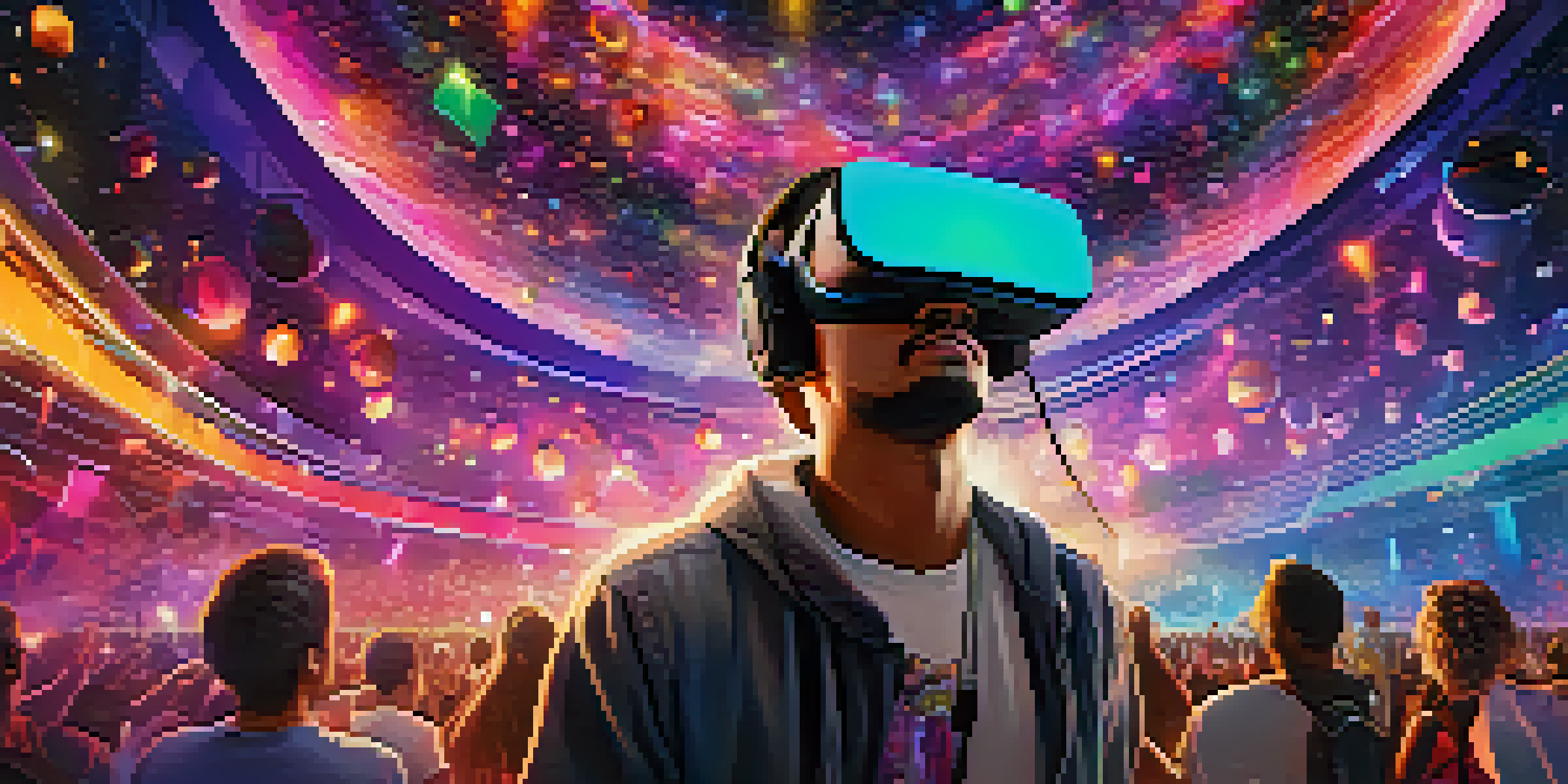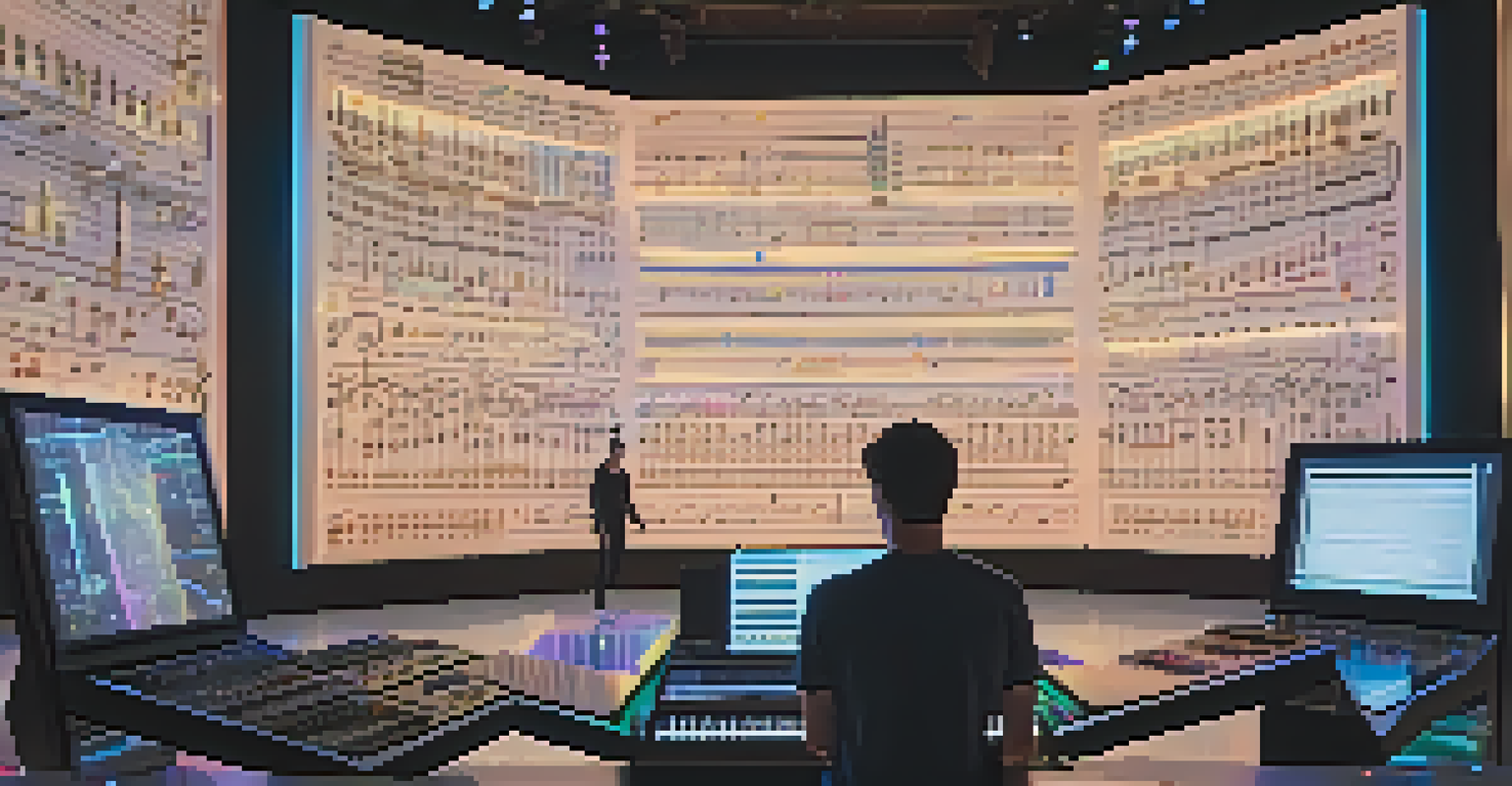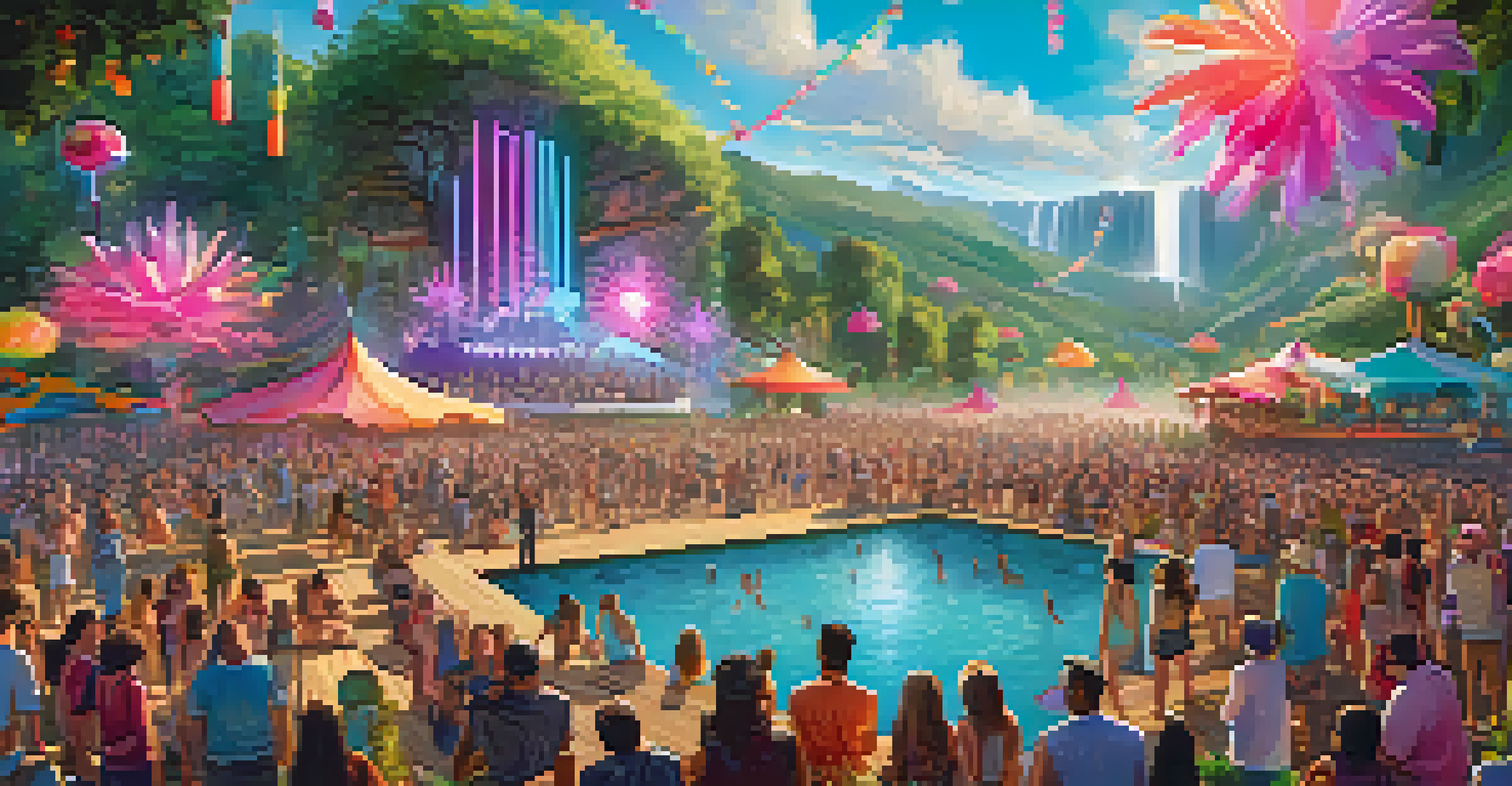The Role of Virtual Reality in Shaping Music Trends

Virtual Reality: A New Frontier for Music Experiences
Virtual reality (VR) is revolutionizing how we experience music, taking us from passive listeners to active participants. Imagine stepping into a virtual concert where you can interact with the environment and artists. This immersive experience allows fans to feel closer to their favorite musicians, creating a deeper emotional connection. As technology continues to evolve, VR is becoming an integral part of the music landscape.
Virtual reality is the next frontier for music, allowing fans to not just listen but to experience and interact with the art in ways we never thought possible.
For instance, platforms like Oculus Venues allow users to attend live-streamed concerts in a virtual space, complete with VR headsets. This kind of engagement not only enhances enjoyment but also opens up new avenues for artists to connect with their audience. Ultimately, VR is reshaping our expectations of what a music experience can be.
Moreover, as more artists embrace VR technology, we can expect a surge in unique and innovative performances that redefine traditional concerts. This shift could lead to a new genre of music events centered around virtual experiences, pushing the boundaries of creativity and entertainment.
How Virtual Reality Influences Music Creation
Beyond live performances, VR is also making waves in the creative process of music production. Artists are beginning to use virtual environments to compose and collaborate in ways that were previously unimaginable. For example, musicians can now create soundscapes in 3D, allowing them to experiment with spatial audio and unique arrangements.

This innovative approach not only enhances creativity but also fosters collaboration among artists regardless of their geographical location. Imagine a musician in New York jamming with a producer in Tokyo, all within a virtual studio space. The possibilities for cross-cultural collaboration are endless, leading to new music trends that blend diverse influences.
VR Transforms Music Experiences
Virtual reality is changing the way fans engage with music, turning passive listening into immersive, interactive experiences.
As VR tools become more accessible, we may see an increase in the number of artists exploring these creative avenues. This could result in a surge of genre-blending music that reflects a global sound shaped by virtual collaboration.
The Rise of Virtual Concerts and Festivals
Virtual concerts and festivals have gained immense popularity, especially during times when physical gatherings were limited. Platforms like Fortnite and Roblox have hosted virtual concerts, drawing millions of viewers and showcasing how VR can create engaging musical experiences. These events often feature elaborate visuals, interactive elements, and even exclusive content for participants.
The future of music lies in its ability to adapt and innovate, and virtual reality is an essential part of that evolution.
The success of these virtual gatherings has prompted many artists to consider them as viable alternatives to traditional concerts. Fans appreciate the convenience of attending from the comfort of their homes while still enjoying a lively atmosphere. This shift in how music events are presented is likely to influence future trends in the industry.
Moreover, virtual concerts offer opportunities for artists to reach a global audience without the logistical challenges of touring. This accessibility could lead to a more diverse range of performances, allowing niche artists to gain exposure they might not have had otherwise.
Enhancing Music Education Through Virtual Reality
Virtual reality is not just changing how we consume music; it's also transforming how we learn it. VR can provide immersive music education experiences, allowing students to engage with instruments and concepts in ways that traditional methods can't match. Imagine learning to play the piano while surrounded by a virtual orchestra, enhancing both understanding and enjoyment.
These immersive experiences can cater to different learning styles, making music education more accessible and engaging for students of all ages. Additionally, VR can simulate real-life performance scenarios, giving learners the confidence to practice and perform in front of virtual audiences.
Innovative Music Creation with VR
Artists are leveraging virtual environments for collaboration and composition, fostering creativity and global connections.
As music education continues to evolve through technology, we may see a new generation of musicians who are well-versed in both traditional techniques and modern methods. This could lead to a more innovative and adaptable music community.
The Impact of VR on Music Marketing Strategies
As artists and labels recognize the potential of virtual reality, marketing strategies are adapting to incorporate this technology. VR offers unique ways to promote music, from virtual reality music videos to interactive experiences that allow fans to explore an artist's world. This kind of marketing not only captures attention but also engages fans on a deeper level.
For example, an artist could create a VR experience that allows fans to step into the story behind their latest album, making the music more relatable. Such immersive marketing campaigns can create buzz and excitement, leading to increased sales and streaming numbers.
As VR continues to gain traction, artists who leverage this technology in their marketing efforts are likely to stand out in a crowded industry. This could redefine how music is promoted in the digital age, emphasizing experiences over traditional advertising.
Challenges of Integrating VR in the Music Industry
While virtual reality holds tremendous potential for the music industry, it also presents several challenges. One significant hurdle is the cost of VR technology, which can be prohibitively expensive for both artists and fans. As a result, the adoption of VR in music may be limited to those with the means to invest in the necessary equipment.
Additionally, there is a learning curve associated with creating and participating in VR experiences. Artists may need to invest time and resources into understanding how to effectively use VR tools, which can be daunting for those who are less tech-savvy. This could lead to a divide between those who can harness the power of VR and those who cannot.
Challenges of VR in Music Industry
Despite its potential, the integration of VR faces challenges such as high costs and a steep learning curve for artists and fans.
Despite these challenges, the potential benefits of VR in music are compelling. As technology becomes more accessible and affordable, we may see a broader integration of VR across the music industry, ultimately enriching the experiences of both artists and fans.
The Future of Music and Virtual Reality
Looking ahead, the fusion of virtual reality and music is poised to change the landscape of the industry significantly. As technology advances, we can expect even more innovative applications of VR, from personalized experiences to fully immersive concerts that transport us to new dimensions. The possibilities are exciting and endless.
Moreover, as artists continue to experiment with VR, we may witness the emergence of entirely new genres and formats that redefine how music is created and performed. This evolution could lead to a richer, more diverse music scene that reflects the voices of artists from around the world.

Ultimately, the role of virtual reality in shaping music trends is just beginning. As both audiences and artists embrace this technology, we can look forward to a future where music is more interactive, accessible, and engaging than ever before.